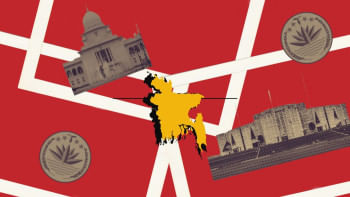Whom do the bureaucrats serve?

When the Awami League government fell on August 5, 2024, following weeks of mass movement, there was a widespread sense of hope that better days lay ahead. The interim government took office on August 8, promising an efficient, pro-people governance system in line with the spirit of the July uprising. Unfortunately, over five and a half months on, it is struggling to even get on the track of that promise, thanks largely to a non-cooperative, past-bound bureaucracy.
According to a recent report by Samakal, several advisers of the interim government have expressed frustration at being unable to carry out their duties properly due to a lack of support from the bureaucrats. Adviser Nahid Islam even spoke about this publicly. As a result, the government has failed to complete 70 percent of the tasks it had set for itself, which is staggering. These unfinished tasks include crucial issues such as the posting of deputy commissioners, withdrawal of politically motivated cases, distribution of free school textbooks, procurement of necessary equipment at various government offices, etc—all matters that needed prompt response.
Apparently, bureaucrats are still being sluggish, resistant, and mostly "strategic" in their work knowing the transient nature of this non-political administration; they are cautious to avoid potential trouble when a political party comes to power through election. Strong resistance is also coming from those who benefited from various perks under the Awami League regime; there are allegations that these officials are intentionally creating bottlenecks for the current administration.
As frustrating as this situation is, it is not entirely unexpected. Bureaucracy in Bangladesh has historically been politicised, used by the ruling party of the day to varying extents. This abuse peaked under the Awami League's rule, which politicised almost every level of government and provided perks and benefits to officials in exchange for loyalty. In return, these officials helped it maintain its authoritarian grip, stifling democratic practices and good governance. This led to a bureaucratic system so entrenched in corruption that any indication of change or reform triggers adverse, almost visceral reactions from bureaucrats fearing they might lose their positions of power and comfort.
Today, some of the old players may have changed, but the old system remains firmly in place. A properly functioning government requires a supportive and efficient bureaucracy. To achieve this, our outdated bureaucratic system must be dismantled to make way for a healthy, accountable system. Bureaucrats must realise that their job is not to pander to the rulers, but the people—the taxpayers. They must check their self-serving attitudes and heed the public demand: to uphold the integrity of their duties.

 For all latest news, follow The Daily Star's Google News channel.
For all latest news, follow The Daily Star's Google News channel. 










Comments